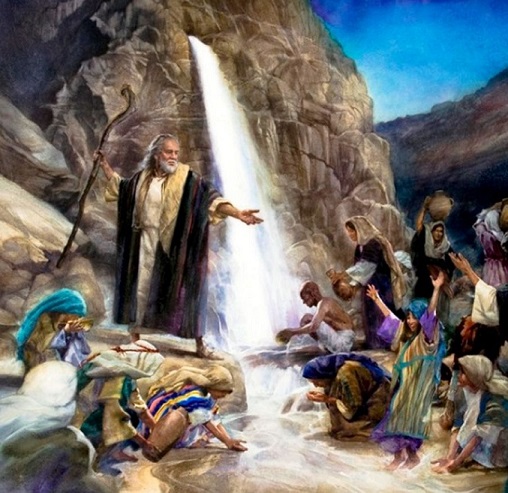Readings: Exodus 17:1-7 | 2 Corinthians 6:1–13 | Mark 4:35–41
Text: Exodus 17:1-7
One of the perpetual pains of the Christian is that we must move on from the place where the Lord feeds us. But it must happen because the place is temporary, and even the green grass (Mark 6:39) upon which the Lord fed the 5,000 withers and fades away. The journey of this life must move on, and we must be dismissed from the Lord’s Table to go back into the world with all of its troubles.
So also, the Israelites moved on from the place where the manna was first given (although it went with them each day and met their need in the wilderness). As much as we may look for permanent change, a lasting glimpse of the perfect, it also isn’t found among us. You would think the people who saw manna and ate the quail which God provided on demand would have settled the matter: The Lord is God, His desire is for our good—to save and not to kill.

But as the people went out tribe by tribe from Sin, they came to a dry place called Rephidim. But, the very name Rephidim is a reminder of the Lord who spreads His protection over His people, who supports and gives them aid.[1] Willfully ignorant of what the Lord has already done for them so far, they attack Moses, demanding water, even accusing him of being the one who brought them out of Egypt to kill them. They choose to attack the Lord’s servant in a way that makes Moses sound like a heartless monster: “Why did you bring us up out of Egypt, to kill us and our children and our livestock with thirst?” Moses, you monster! Think of pain you’re causing mothers and shepherds!
This is what’s called an ad hominem attack—an attack against the man—and it’s unfortunately more common in the Church than we’d like to admit. Before the rabble, Moses looks like a heartless jerk because of how one small part of the story is cast. But the grumbling is actually just a mask for something else, and Moses puts his finger on it: “Why do you quarrel with me? Why do you test the Lord?” Surely there is no human prophet, apostle, or pastor who is without fault, but the attacks against the man in the office are more often than not a symptom of a faltering faith.
Many times, people have griped to me about some fault they saw in a previous pastor. But behind the would-be flattery (He didn’t do it my way, but I’m sure you see things my way), is a challenge not to who is in the office, but a disagreement with God and putting Him to the test.

What does it mean to put God to the test? Well, first it’s good to mention that tests aren’t always bad. The Lord often puts us to the test, as I mentioned last week. He tests what’s in our hearts by the trials He sends. And faith which trusts in God’s promises and steps out in faith and a desire to please Him puts God’s faithfulness to the proof. But putting the Lord to the test is when our sinful hearts hold onto the idea that we know better than the Lord in how He has arranged things. In the Israelite’s case, it’s the Lord who’s made a mistake by bringing them into the wilderness, rather than teleport them straight from Egypt to Canaan’s shores. How dare He cause us to hunger and thirst! It’s the same attitude that says, how come God has arranged things this way in the Church and my life? Why’s it so important to belong to a congregation when I might not like everyone in it? I’ve worked so hard to live a good life, Lord, why do you keep making things so hard on me? Why have you brought your faithful people into this time where seemingly nobody cares about your Word and they instead celebrate pride in something which you abhor (June is “LGBT Pride Month in the world)?
But putting the Lord to the test, versus trusting what He says is found in the outcome. The heart that wants to put Him to the test is already in unbelief (toying with it, or perhaps even well on their way to being gone). But how great the danger is! Should we find ourselves in this unbelief, we’re on the precipice over the fires of hell! And even though we may be unaware of this, the Lord knows full well and is crying for us to turn, lest we die. Listen to His plea, while we will hear His voice, in Psalm 95:
Today, if you hear his voice,
8 do not harden your hearts, as at
Meribah,
as on the day at Massah in the wilderness,
9 when your fathers put me to the
test
and put me to the proof, though they had seen my work.
10 For forty years I loathed that
generation
and said, “They are a people who go astray
in their heart,
and they have not known my ways.”
11 Therefore I swore in my wrath,
“They shall not enter my rest.”

It’s the hard heart which brings so much trouble and spiritual death. Once the heart is hard, the Word of God, whether it’s in the pages of Scripture or preached by His messenger, the hard heart refuses to hear. And it comes in a number of forms (let these be a warning to us!): avoiding the one who preaches (plugging our ears to what the Lord would say); choosing a different, adulterated Gospel that tells us that God is okay with us; joining the multitude of other jilted former Christians who can share stories of how they “used to go to church” but moved on.
Despite our unbelief, the Lord’s purpose remains unchanged: To turn us from unbelief to faith. His Holy Spirit, at work in the Word, is able to save us from this abysmal end. Today is the day He preaches to you, and if you hear His voice, thanks be to God because His saving work is being accomplished in you! That day, He did give the people water at Massah and Meribah, but the Lord God refused to help them along in unbelief. That would be tantamount to handing them the rope with which to hang themselves.
Instead, He sends His Spirit-filled Word to save us from our unbelief. This is why He gives us His Holy Spirit: “But when the Helper comes, whom I will send to you from the Father, the Spirit of truth, who proceeds from the Father, he will bear witness about me…I have said all these things to you to keep you from falling away.” (John 15:26—16:1)
The Apostle to the Hebrews explains,
6 Since therefore it remains for some to enter it, and those who formerly received the good news failed to enter because of disobedience, 7 again he appoints a certain day, “Today,” saying through David so long afterward, in the words already quoted,
“Today, if you hear his voice,
do not harden your hearts.”

11 Let us therefore strive to enter that rest, so that no one may fall by the same sort of disobedience. 12 For the word of God is living and active, sharper than any two-edged sword, piercing to the division of soul and of spirit, of joints and of marrow, and discerning the thoughts and intentions of the heart. 13 And no creature is hidden from his sight, but all are naked and exposed to the eyes of him to whom we must give account.
14 Since then we have a great high priest who has passed through the heavens, Jesus, the Son of God, let us hold fast our confession. 15 For we do not have a high priest who is unable to sympathize with our weaknesses, but one who in every respect has been tempted as we are, yet without sin. 16 Let us then with confidence draw near to the throne of grace, that we may receive mercy and find grace to help in time of need. (Hebrews 4:6-16)
We can be eternally grateful that God give us over to our times of weakness and unbelief; but with a dedication greater than any on earth, He is always calling to us and calling to all who would hear His voice.
Let us pray:
O God, You justify the ungodly and desire not the death of the sinner. Graciously assist us by Your heavenly aid and evermore shield us with Your protection, that no temptation may separate us from Your love in Christ Jesus, our Lord. O God, protect the tempted, the distressed, and the erring, and gently guide them. By Your great goodness bring them into the way of peace and truth. Graciously regard all who are in trouble, danger, temptation, or bondage to sin, and those to whom death draws near. In Your mercy draw them to Yourself; through Jesus Christ, our Lord. Amen.

[1] Brown, Francis, Samuel Rolles Driver, and Charles Augustus Briggs. Enhanced Brown-Driver-Briggs Hebrew and English Lexicon. Oxford: Clarendon Press, 1977.



